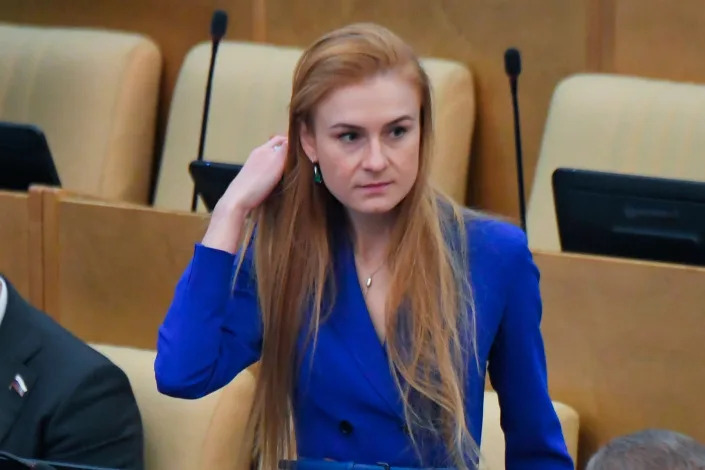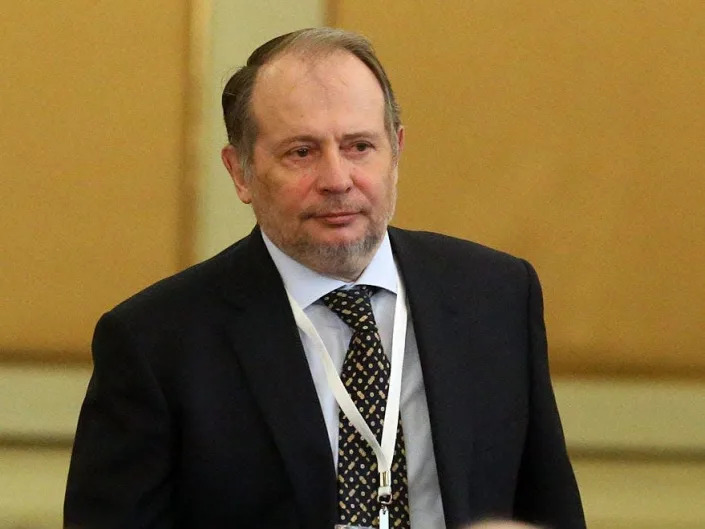MISINFORMATION
Russian Agent Maria Butina Claims Ukrainians Are Bombing Themselves
Ryan Bort Wed, March 9, 2022
Maria Butina, the Russia agent who infiltrated the National Rifle Association and charmed several Republican figures before landing an 18-month prison sentence, has emerged as one of Vladimir Putin’s most vocal advocates as Russian forces continue to wreak havoc on Ukraine and its people. In fact, Butina is so deep in Putin’s propaganda hole that she’s suggesting it’s Ukraine itself, not Russia, laying waste to Ukraine.
“We have tons of evidence that the Russia army does not touch, does not bomb civilian populations,” she told BBC Radio’s Nick Robinson on Wednesday.
The remark came at the end of a tense exchange in which Robinson pressed Butina on whether she believed Ukraine has been bombing itself. “I want to seriously see the evidence that these are Russians,” Butina said before touting Russia’s plan to create “humanitarian corridors” to evacuate people from Ukrainian cities under attack. The corridors, however, lead into Russia and Belarus. “They are citizens of Ukraine, they should have the right to evacuate to the territory of Ukraine,” a spokesperson for Ukrainian President Volodomyr Zelensky told Retuers.
“Are you suggesting that the shells that are flattening Ukrainian cities are being fired by Ukrainians?” Robinson asked again.
“I hope not,” Butina said. “I hope no one in the world can bomb their own population. I don’t want to believe in that and I don’t want to believe can torture an orthodox priest, but I talk these people, many of them. It’s un-normal.”
It continued like this, with Butina refusing to offer any evidence or deny that Ukraine is bombing itself.
Butina followed up her claim that Ukraine is bombing itself with a Telegram post arguing that Zelensky is not in Ukraine. “Zelensky in Kyiv? The facts say otherwise,” she wrote, linking to a post citing things like Zelensky’s hairstyle changing as “evidence” that he has fled the nation.
Zelensky has been in Ukraine since the invasion, and even shot a video from his office in Kyiv on Monday night.
Butina was deported from the United States to Russia in 2019 after serving time for working as a Russian agent. She’s now a member of the Russian parliament, and has been using her notoriety to spread disinformation about what’s happening in Ukraine, and to show support for Russia’s aggression.
One of the ways she’s done so is by wearing a “Z,” which began appearing on Russian tanks last month and has since become a symbol of support for the invasion. Butina shot a video of herself drawing a “Z” on her lapel, and her Instagram is filled with “Z” imagery.
“Do your work, brothers,” Butina said in the video, according to The New York Times. “We will always support you.”
Butina is a big fan of the “Z.”
Fracis Scarr, who monitors Russian state TV for the BBC, noted that Butina last month appeared on a Russian talk show to argue that Kyiv shouldn’t be handing out arms to Ukrainians because “people don’t know how to handle them and a child might be killed at home.”
Butina’s comments are ironic considering she founded a Russian nonprofit called Right to Bear Arms before heading to America to cavort with the NRA, which she pleaded guilty to using to create a backchannel between the Trump administration and Russia.
Butina’s ability to ingratiate herself with the NRA led to contact with several GOP-affiliated figures. She even claimed to have used her Trumpworld connections in 2016 to help influence Trump’s pick for secretary of state.
She was also friendly with lawmakers like Rep. Thomas Massie (R-Ky.), who was one of three Republicans who last week voted against a resolution supporting Ukraine.
Butina isn’t the only red-haired Russian agent standing up in support of the invasion. Anna Chapman, who in 2010 pleaded guilty to conspiracy charges before being deported, is using the “wave of patriotism” the attack has inspired to hawk her clothing brand.
“What a wave of patriotism and faith in our country I have not seen Russian people in my entire life … Thank you for this,” Chapman wrote on Instagram. “On this wave of patriotism, I would like to fill you in on my clothing brand, which I created out of love for my country.”








